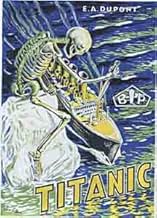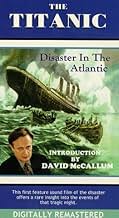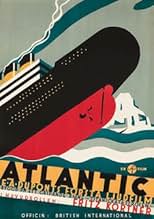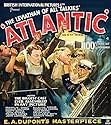Füge eine Handlung in deiner Sprache hinzuOn its maiden voyage in April 1912, the supposedly unsinkable RMS Titanic hits an iceberg in the Atlantic Ocean.On its maiden voyage in April 1912, the supposedly unsinkable RMS Titanic hits an iceberg in the Atlantic Ocean.On its maiden voyage in April 1912, the supposedly unsinkable RMS Titanic hits an iceberg in the Atlantic Ocean.
- Regie
- Drehbuch
- Hauptbesetzung
Gordon James
- Capt. Collins
- (as Sydney Lynn)
Empfohlene Bewertungen
I purchased this film on DVD to add to my collection of Madeleine Carroll films, and although the stunningly beautiful actress does not have a tremendous amount of screen time, I was not disappointed in the final product. I've never particularly cared for disaster films, and the Cameron blockbuster of a few years ago left me decidedly cold, as it were. Not being an expert on the events surrounding the sinking, I was still quite sure that this mega-hit had little relation to what actually transpired on that fateful night. In any event, I am convinced that the film under review is of greater historical accuracy, and unlike the other reviewers, I am not particularly discouraged to discover that a film made almost 80 years ago is not quite as "spiffy" as more recent products. At the very least, films of this type should be regarded as valuable documents of the ways things were done in the not too distant past, and when you realize that "Atlantic" was made a mere 17 years after the Titanic went down, that is all the more reason to cherish it as an invaluable time capsule of a significant event in the annals of the 20th century that still apparently fascinates a great many people.
As far as the individual performances are concerned, I thought that the players effectively conveyed the starkness of the dilemma the doomed passengers were facing, especially the futility of those remaining men who had hope no hope of salvation, the end being only a matter time. Of particular note was the abrupt contrast between the gay frivolity that permeated the mood immediately before the bad news was conveyed by Lanchester and what immediately followed. Add to that Monica's frantic separation from her husband, as she was literally dragged on to the hanging lifeboat, was quite poignant, made all the more so when the news that she was pregnant became known later.
For those interested in a well made vintage film that provides a fascinating look at a sensational event with which practically everyone alive has at least some inkling of, I highly recommend this film. (And there's the added bonus of a very young Madeleine Carroll to feast your eyes on).
As far as the individual performances are concerned, I thought that the players effectively conveyed the starkness of the dilemma the doomed passengers were facing, especially the futility of those remaining men who had hope no hope of salvation, the end being only a matter time. Of particular note was the abrupt contrast between the gay frivolity that permeated the mood immediately before the bad news was conveyed by Lanchester and what immediately followed. Add to that Monica's frantic separation from her husband, as she was literally dragged on to the hanging lifeboat, was quite poignant, made all the more so when the news that she was pregnant became known later.
For those interested in a well made vintage film that provides a fascinating look at a sensational event with which practically everyone alive has at least some inkling of, I highly recommend this film. (And there's the added bonus of a very young Madeleine Carroll to feast your eyes on).
For some reason this 1929 film was titled Atlantic when it could have easily been titled Titanic, or something with "Titanic" in its title (however it has been released on video as Titanic.) I suppose they might have titled it Atlantic due to fictional characters and stories that didn't really happen on The Titanic and its fateful voyage, but the story of the film is clearly the disaster that happened to The Titanic. The ship in the film is crossing The Atlantic, and enters areas known to have icebergs. Many of the characters introduced are wealthy types, and we know there were very rich and prominent passengers on The Titanic. Some of the characters include: A husband and father, who cheats on his wife during the voyage; his wife, who tearfully knows her husband was with another woman; their daughter, who outspokenly resents her father for cheating on her mother; a recently wed couple with child on the way; a wheelchair bound gentleman who seems to become the wisdom during the crisis; his wife, who will not leave his side when it's "women and children first;" and a man who seems to drink heavily even before the disaster happens. During the voyage the ship strikes an iceberg, and begins to sink. Lifeboats are being filled with women and children as the ship sends S.O.S. Pandemonium breaks out with many passengers, but our main characters seem to fall into a sad calmness. There is a gathering of many passengers in a lounge, and they drink or play cards to pass the time while waiting to die. On another part of the ship, people are huddled together and singing, "Nearer My God To Thee." Soon all goes black and we know the ship has gone down. This is where the film ends, and there are no scenes of the lifeboats after the sinking. Nor are we shown any scenes of surviving characters, or a rescue ship. Obviously many facts of what happened on The Titanic are correctly portrayed, but other events in Atlantic are either incorrect to The Titanic's disaster, or added as fiction. Atlantic was released by British International Pictures, and the quality of this feature is fine. The film has its typical (of the era) share of crudeness (grainy, jumping, lighting, editing), and there are several instances where it seems like a silent film. There are a couple instances where cheerful music seems very inappropriate to situations going on in the film, (I don't mean when the band begins to play as passengers are being put in lifeboats; this inappropriate music is before the ship strikes the iceberg.) There are a few instances of continuity errors in Atlantic. Atlantic does not attempt much in the way of special effects, but what is attempted is nicely done. The sinking of the ship is not shown, but is indicated when the screen goes black one final time. Having the film end right at the sinking creates a feeling of incompleteness, and it seems the story should have had a more meaningful conclusion. The acting in Atlantic is fair to good, and the film as a whole is fair to good. I found the film to be more thought-provoking than exciting, and it is an interesting disaster effort.
Yes I know "talkies" had just been invented for the cinema 2 years earlier when this was produced in 1929 but this film showed that much had to learnt about the art of producing films.It comes over as a filmed "hammy" stage play with the actors melodramatically enunciating their lines,rolling their eyes, using too many pregnant pauses and using gestures more appropriate to silent cinema, which I suppose was normal during the process of educating them to appear more naturalistic on screen.The gaps between lines spoken should have been tightened up during editing as it considerably slows the film.It is now only of interest for Titanic buffs who want to see an early example of this marine accident on film.In next chronological order they could see "Titanic" (1953) A Night to Remember (1958)"Titanic (1997), to see how the cinema's depiction of this tragedy as evolved over the years.There have been many documentaries and TV films made including the atrocious "SOS Titanic" (1979) On my version which is a DVD, David McCallum gives the introduction.It was he who played Harold Bride Marconi's junior wireless operator in "A Night to Remember"(still the best feature film - please read my "Tribute to Walter" comments on IMDb under Howard Morley.demon.co.uk)and gave the commentary on the series of 4 videos entitled "End of a Dream" so he was well qualified to give the narration.Of more interest I found was a recording accompanied by actual photos of the 1912 US Senate hearing which is also on the DVD.Actors speak the actual words spoken by Lightoller 2nd officer, J Bruce Ismay,Managing director of White Star, Harold Bride and others including Gloria Stewart (The "old Rose" in Titanic 1997) whose voice is used for one of the first class women survivors.
No movie with Madeleine Carroll in its cast could possibly be unwatchable. That said, I have to add that this British film comes close. The story takes place on board the `SS Atlantic' and it's loosely based on the `Titanic's' unfinished voyage. The word `unsinkable' is spoken, the liner strikes an iceberg, and we hear a heavenly choir sing `Nearer My God to Thee.' The doomed passengers eventually take over the anthem, in a clever bit of sound work. But the year of the film's release (1929) means that a modern viewer has to accept otherwise primitive sound and many of the acting conventions of silent films and the stage. These aren't problems. The film's major flaw is pacing, and pacing had been well developed in silents. However, if the dialog were delivered at a realistic speed, the movie's running time would be cut in half. The intended effect was drama (and clarity in a new medium), but the result unhappily is tiresome now. The film's structure is preposterously illogical and inept. Paradoxically, I found certain details of the editing quite modern in technique: fine, abrupt cuts from one area of the ship to another, sometimes even on sound effects. Although we're on board the `Atlantic' from the first shot, we were well over 4 minutes into the movie before I discovered that fact. There are long, intrusive musical passages by the ship's dance orchestra. (Entertaining, easy sound.) Personal stories are presented in an utterly uninvolving and unconvincing way. Don't even think of spectacle. The berg is a tiny thing and the exterior damage it does to the ship's hull is a minor dent. However, the scenes of passengers swarming into the lifeboats - clearly staged on a real liner, presumably tied up to a dock - generate great excitement. Other than the glorious Miss Carroll, these sequences are the film's only points of excellence. As the movie and the ship near their end, the screen goes totally black several times when the power generators begin to fail. Their last, eternal blackout is the end of the film, with a sunset/sunrise tacked on, a clumsy symbolic effect. `Atlantic' is a cinema curiosity. At best.
How interesting that E.A. Dupont who created one of germany's most memorable silent films (VARIETY) also helmed one of England's first talkies. Obviously he was uneasy with the medium of talking pictures, note how the first 6 minutes of this film is entirely visual. Most of the cast had stage experience, you can tell because they over-exaggerate their lines and cannon out the words like they were playing to the back row. Still this is a well paced dramatic film and the final few minutes have an impact that can stand on their own alongside the later versions, TITANIC and A NIGHT TO REMEMBER. (I am deliberately excluding James Cameron's film with its budget that would have fed a 3rd World country for 10 years and its plethora of computer FX.)
Wusstest du schon
- WissenswertesThe White Star Line forbade the production company from referring to the ship in this film as The Titanic.
- PatzerThe women's hairstyle and dresses are from 1929.
- Alternative VersionenReleased with separate English, French and German soundtracks.
- VerbindungenAlternate-language version of Atlantik (1929)
- SoundtracksWalking With Susie
(uncredited)
Written by G.H. Elliott
Played by the ship's band as Larry and Monica enter the Smoking Room.
Top-Auswahl
Melde dich zum Bewerten an und greife auf die Watchlist für personalisierte Empfehlungen zu.
Details
- Erscheinungsdatum
- Herkunftsland
- Sprache
- Auch bekannt als
- Titanic: Disaster in the Atlantic
- Drehorte
- Produktionsfirma
- Weitere beteiligte Unternehmen bei IMDbPro anzeigen
Box Office
- Budget
- 2.000 £ (geschätzt)
- Laufzeit1 Stunde 30 Minuten
- Farbe
- Seitenverhältnis
- 1.20 : 1
Zu dieser Seite beitragen
Bearbeitung vorschlagen oder fehlenden Inhalt hinzufügen




































